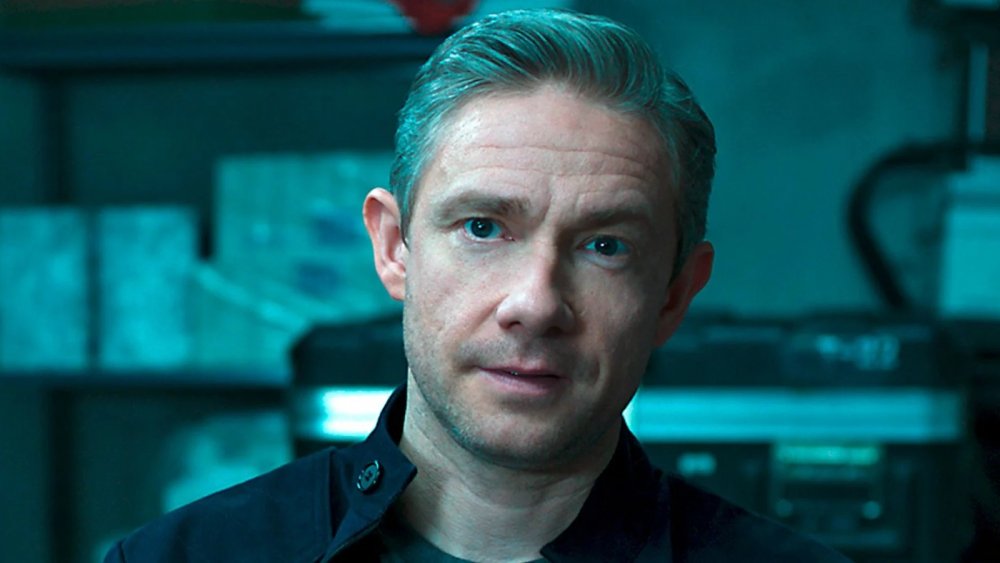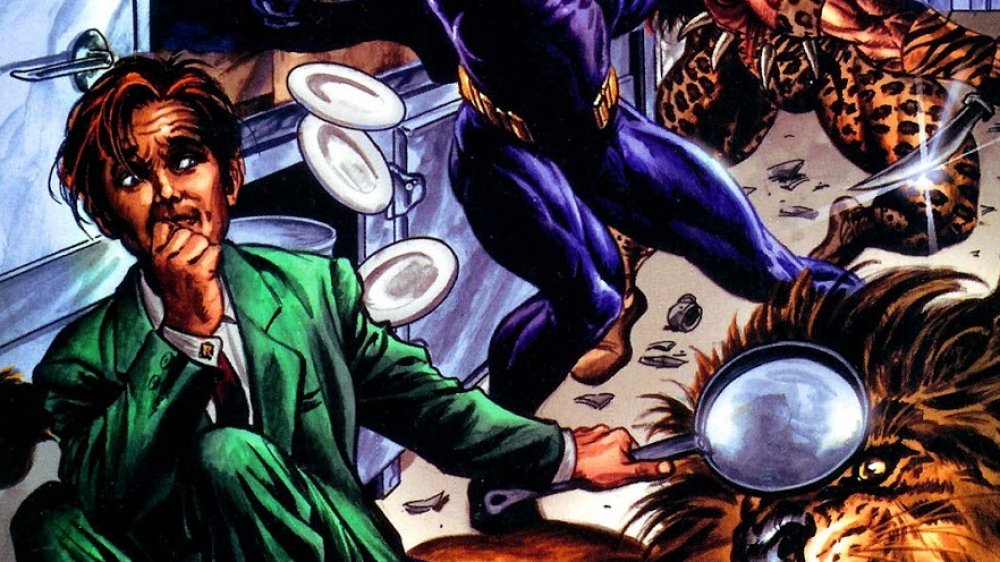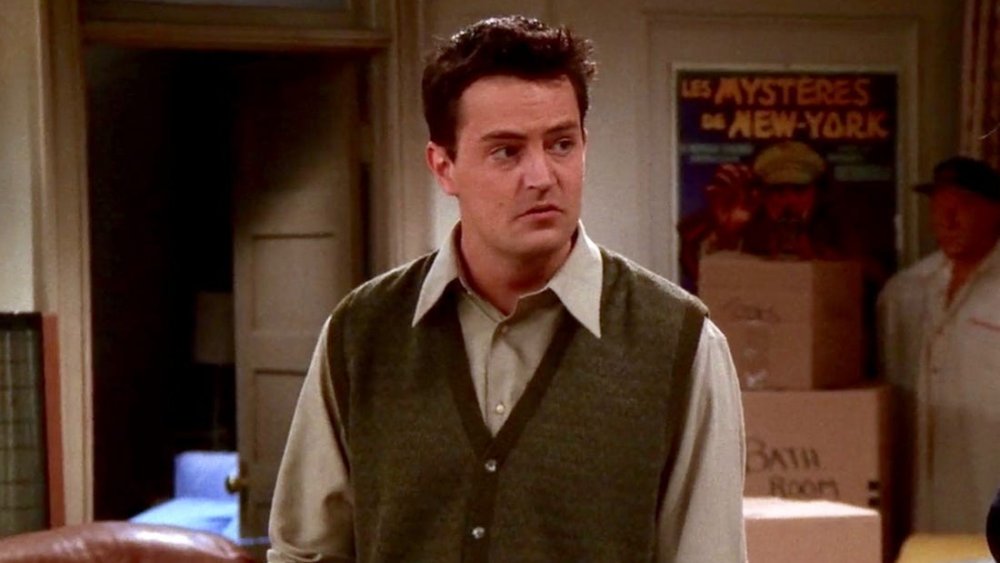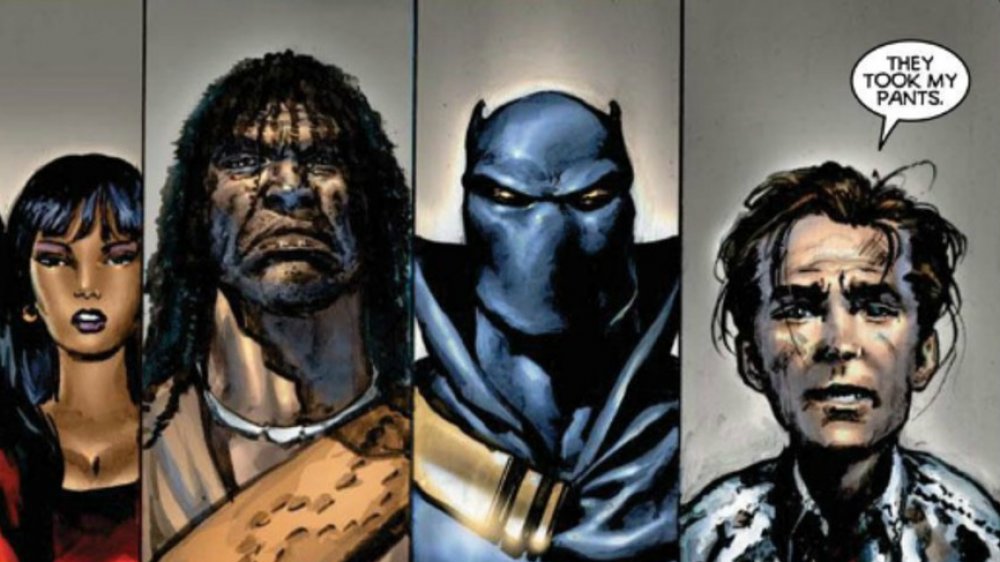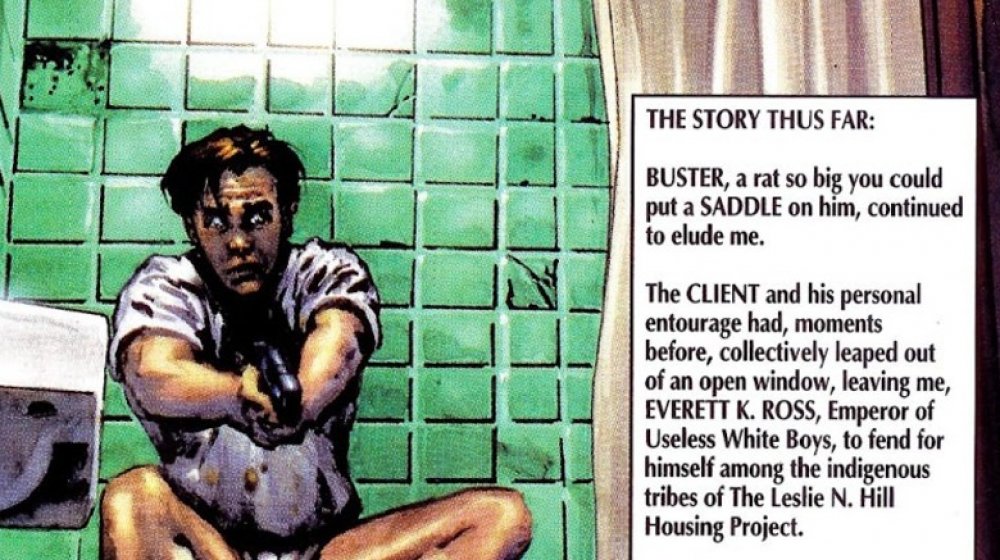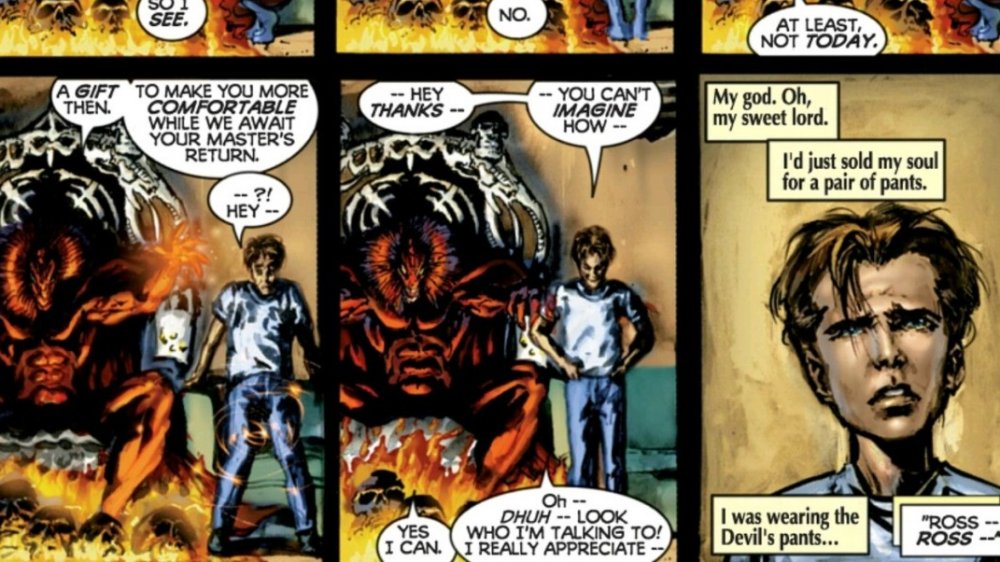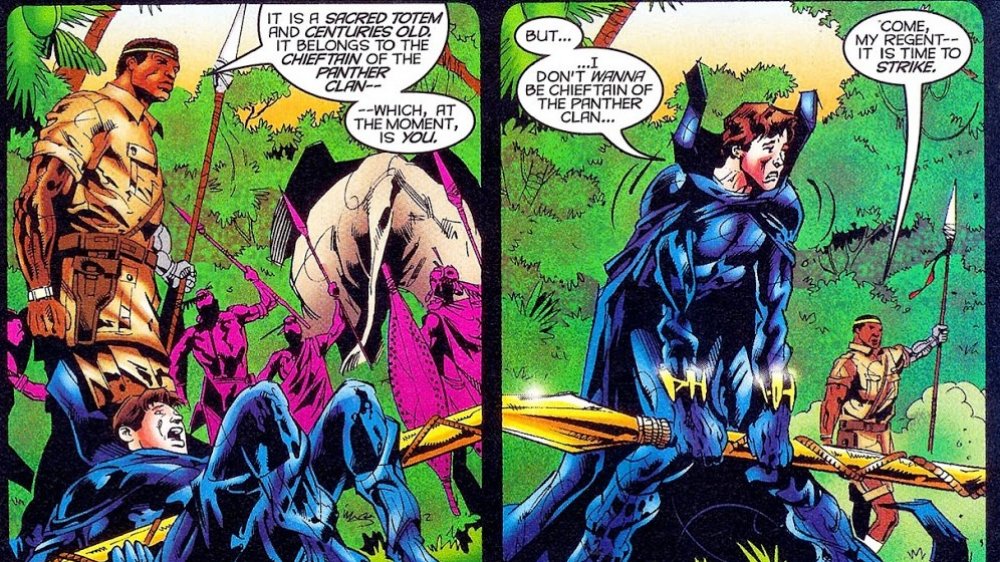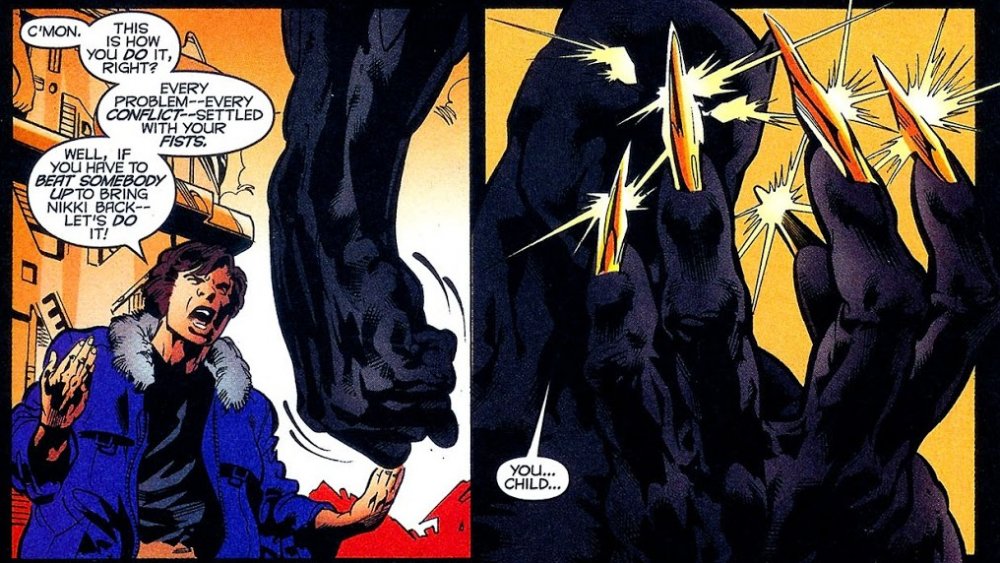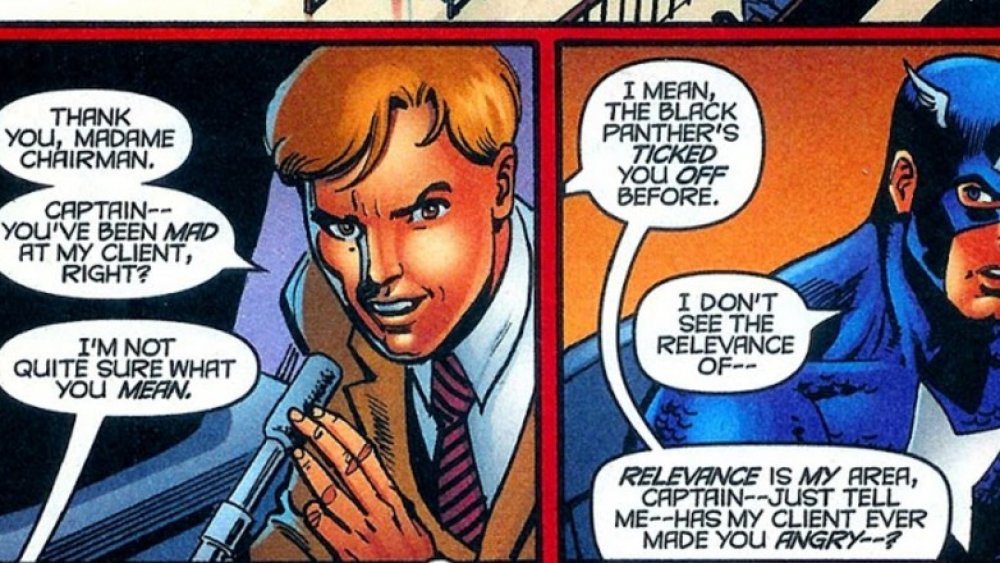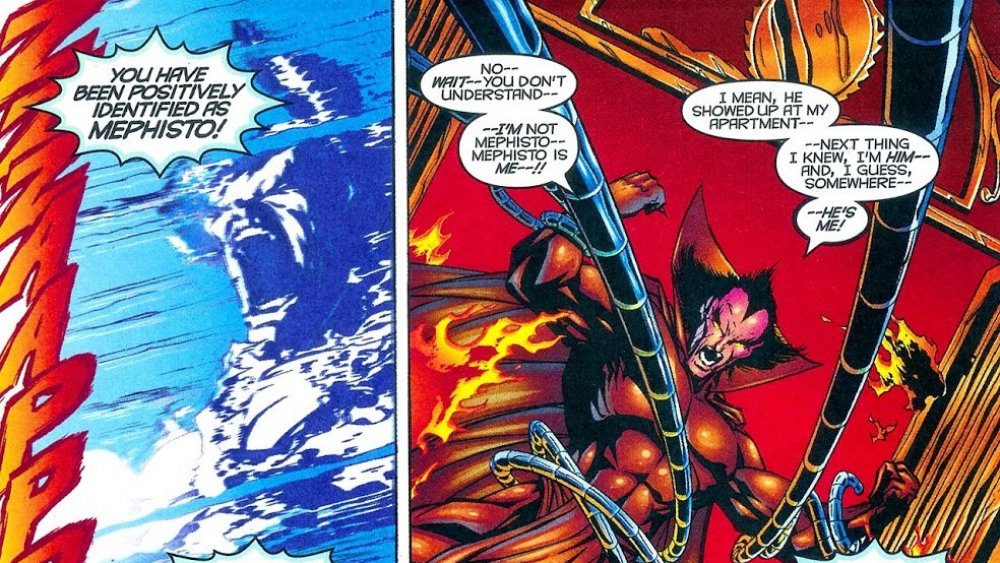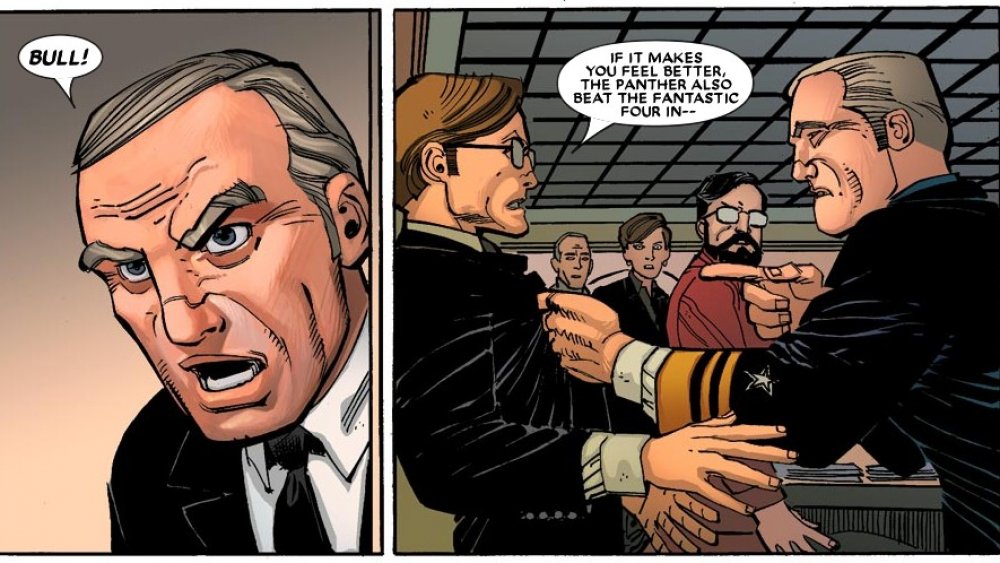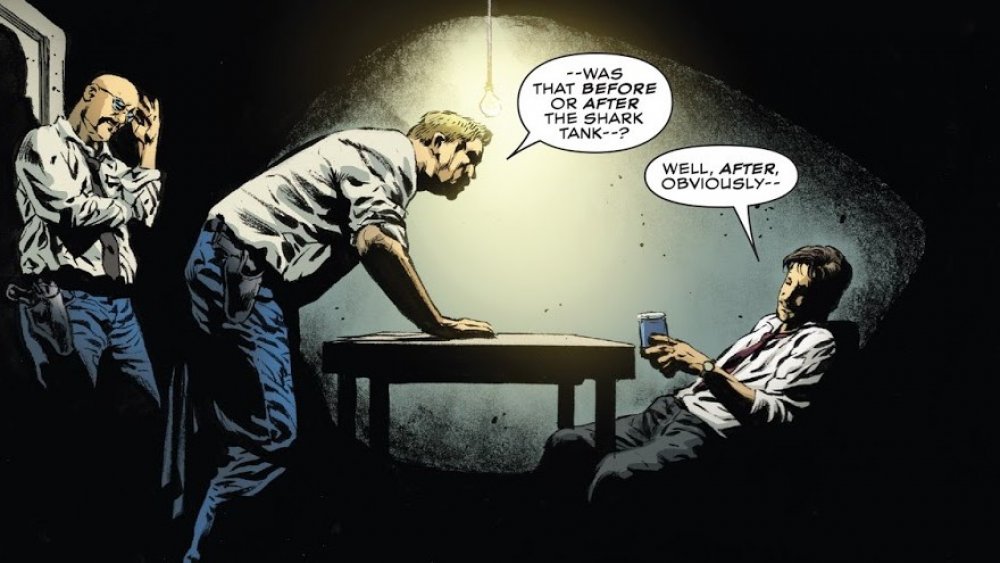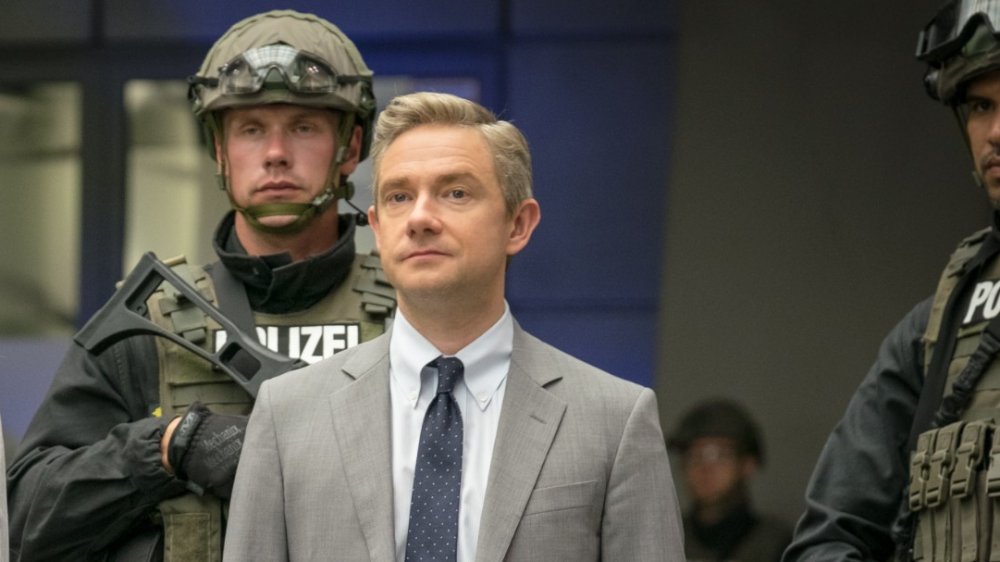The Untold Truth Of Marvel's Everett Ross
In 2016, actor Martin Freeman — known far and wide for playing Watson in Sherlock and Bilbo Baggins in Peter Jackson's The Hobbit trilogy — joined the Marvel Cinematic Universe in the explosive Captain America: Civil War. Freeman's Ross is a CIA agent tasked with capturing the Winter Soldier and keeping the heroes who refuse to sign the Sokovia Accords on a short leash. Ross then plays a larger and more heroic role in 2018's Black Panther, helping T'Challa reclaim Wakanda and defeat the villainous Killmonger. What you may not know is that Freeman's character is pulled directly from the source material, and he's a fan-favorite narrator who's not quite the secret agent we meet on the big screen.
Ross first shows up in 1998's Ka-Zar #17, in what creator Christopher Priest called "a warm-up of sorts." Not long after, Priest's critically acclaimed run of the Black Panther comic began, from which director Ryan Coogler got much of his inspiration for the 2018 blockbuster. With some exceptions, most issues of Priest's Black Panther are narrated by Ross as he reports to a superior, and he usually tells his stories in a way the fans enjoy more than his bosses. While Ross would largely be absent from Marvel after Priest's Black Panther run concluded, he never disappeared from the comics entirely. And if you want to learn more about this fascinating character, keep reading for the untold truth of Everett Ross.
Who is Everett Ross?
Everett K. Ross — his middle initial stands for Kenneth — wasn't prepared to be within 100 miles of the world of superheroes. When we first meet him in the comics, he works for the State Department's Office of the Chief of Protocol when he's assigned the relatively simple task of escorting a foreign diplomat — T'Challa, the king of Wakanda. What Ross thinks should be an easy assignment changes his life forever. Ross soon becomes a part of a drama including supervillains, drug dealers, mud wrestlers, and even the devil himself.
Throughout his time in Black Panther, Ross never truly accepts the world he's become a part of. The neurotic, sarcastic bureaucrat never learns how to handle the extraordinary events he witnesses, nor does he understand why Black Panther, or anyone else, insists on keeping him around. Regardless, Ross eventually forms a friendship with T'Challa, in spite of the craziness and tragedy that follows the Wakandan monarch.
Ross was based on a familiar 'friend'
Early on in Christopher Priest's Black Panther run, many fans saw Everett Ross as a tweaked version of Alex Keaton — the character Michael J. Fox made famous on the '80s sitcom Family Ties. At the time, Black Panther readers largely felt Fox would be the only choice to play Ross in any upcoming film adaptations. But according to Priest, Ross was actually inspired by a different sitcom funny man.
In Priest's chronicles of his comic book career on his website, he writes that while the name Everett K. Ross was a riff on Fox's Alex P. Keaton, the character was largely based on Matthew Perry's Chandler Bing from Friends. In fact, he literally used the name "Chandler" in early Black Panther scripts before deciding on Ross. He saw Chandler as a "horrified fish out of water" in regards to his friends' personal lives, which is the exact vibe you get from Ross when he's dropped into Black Panther's world.
Priest writes that he created Ross as the perfect way to introduce fans to his version of Black Panther. He says he wrestled with what he called "reader apathy and resistance" to a character who'd been left on the shelf for years. Telling the stories through Ross' point of view, Priest writes, gave voice to readers' skepticism, as well as amplifying "Panther's mystery and overall enigma as [Ross'] monologues would be, at best, a guess about Panther's whereabouts and motives."
How Everett Ross met T'Challa
In 1998's Black Panther #1, Everett K. Ross is sent on the assignment that changes everything for the better ... as far as readers were concerned, though Ross himself might disagree. Since T'Challa usually travels to and from the United States alone, Ross feels perfectly confident picking the king up from the airport with nothing but his two-seat Mazda Miata. But as he pulls up to the curb, happily blasting Kool & the Gang's "Jungle Boogie," Ross finds a huge procession of dozens of Wakandans waiting for him, including T'Challa, General Zuri, and the king's bodyguards/wives-in-waiting, the Dora Milaje.
Black Panther, we learn, is in America to do more than stop by Avengers Mansion. He's there to respond to what the American papers call "Wakandagate," a scandal where a young girl was murdered, and her death was connected to a charity bankrolled by the government of Wakanda. It doesn't take T'Challa long to realize the murder is part of a plan to lure him away from Wakanda so the villain Achebe can stage a coup. Hapless and helpless Everett K. Ross is along for the entire ride, from the thrashing of drug dealers in New Lots, Brooklyn, to T'Challa's eventual return to Wakanda to retake his kingdom.
The story thus far
Black Panther fans would come to know and love the phrase "the story thus far." It's the line that opens almost every issue of the 1998-2003 run of Black Panther, and ironically, it almost never actually was the story thus far. At least, not entirely.
With Black Panther, Christopher Priest uses a so-called "cut-up" style of storytelling that presents everything way out of chronological order. His very first issue on the series is a perfect example. The first page of Black Panther #1 has Ross in his underwear and a T-shirt, squatting on top of a closed toilet and pointing a gun at a rat. In the meantime, a drunken Zuri is in another room, reciting the entire history of Wakanda. This is how Ross chooses to tell the story to his boss and girlfriend, Nikki Adams. She insists he start from the beginning, but Ross continues to ping-pong from him and the entire Wakandan procession getting arrested to Ross and Zuri facing off against bikini-clad women in a mud wrestling match to Ross trying and failing to intimidate a group of grinning criminals with his State Department badge.
It's a method that Priest would continue to use, more or less, in subsequent comics like the 2016-20 volume of Deathstroke.
Ross and the devil's pants
Ask any Ross fan about the character, and you won't have to wait long to hear about his infamous pants scene.
Black Panther #1 ends with the devilish Mephisto arriving at T'Challa's New Lots apartment, looking for the king. It's Ross who answers the door, still in T-shirt and underwear because he loses his pants earlier in a clash with mud-wrestlers. In Black Panther #2, we see Mephisto choose to patiently wait for the king on his own bone-hewn throne, while Ross sits nearby on the couch. Sensing Ross' nervousness, Mephisto uses his magic to make a pair of pants appear. Ross is thankful at first, until his realization, "My god. Oh, my sweet lord. I'd just sold my soul for a pair of pants. I was wearing the devil's pants." Later, we see Ross strip off his pants to regain his soul, but it doesn't work. Every pair of pants he removes reveals another one, until in Black Panther #4, we see what looks to be dozens of pairs pants piled up at his feet.
Of course, if you look at the scene with a more careful eye, Ross doesn't really sell his soul for a pair of pants. Mephisto calls the pants a "gift," and Ross never offers his soul for them, but it doesn't take away from the humor of the scene.
Everett Ross, ruler of Wakanda
In spite of Ross being hopelessly lost in Black Panther's world, T'Challa proves he trusts the sardonic everyman more than most. In 1999's Black Panther #13, T'Challa entrusts Ross with the fate of his nation by naming Ross the regent of Wakanda in his absence. As T'Challa explains to Ross, his mother, Ramonda, is still recovering from wounds she suffered from the villainous Achebe, W'Kabi is rebuilding the nation's security grid, and Zuri would — in Panther's words — "sink us into war inside of a day."
While many might understandably fantasize about being a king, even temporarily, it isn't an appointment Ross appreciates very much. He doesn't like being awakened at 4 AM by tribal drums, and he really doesn't like being made to join W'Kabi on the ritual of the hunt. Dressed in Black Panther's garb, which is way too large for him, and barely able to lift the huge Idouah — the spear of Bashenga, founder of the Panther tribe — Ross isn't just a fish out of water, he's a fish in the wrong galaxy. It's only the unlikely intervention of the newly resurrected Erik Killmonger in Black Panther #15 that saves Ross from being crushed by a stampeding elephant.
Ross vs. Black Panther
Throughout Black Panther, T'Challa almost always refers to Ross as "Friend Ross," and in 2000's Black Panther #25, that phrase is the last straw on Ross' back. See, tensions have been building between the two for a while. Ross is fed up with barely surviving attacks by zombies, supervillains, and elephants. He's tired of being punished by his government for his exploits with Black Panther. He's still mourning the loss of his girlfriend, Nikki, who was murdered by Nakia in the previous issue, and he's yet to process the revelation that Nikki and T'Challa were once lovers.
It all boils over in Black Panther #25, when Ross finds himself once again in an unbelievable situation with T'Challa — stuck on an alien planet with Black Panther as part of the 2000 line-wide event Maximum Security. For two pages, Ross unleashes a torrent of anger on T'Challa, finally punching him in the face. Then T'Challa lets loose, chopping a nearby alien pillar in half with one swipe of his claw. He never physically touches Ross, though he scares him plenty.
Ironically, the conflict reveals exactly why Black Panther has put so much faith in Ross and why he calls him a friend. Ross became his buddy, T'Challa says, at the airport when they first met. Ross realizes this means that with T'Challa's heightened senses, he was able to smell Nikki on Ross. This was all T'Challa needed to know about Ross because, as the king says, Nikki "could only have loved the noblest of souls."
The trial of Black Panther
In 2001, Black Panther's "Sturm und Drang" storyline saw the titular hero embroiled in a conflict involving Namor the Sub-Mariner, the Deviants of Lemuria, and his old enemy Klaw. The climax comes with a battle between Black Panther and Klaw, and once the bad guy is defeated, that isn't enough for the hero. Black Panther decides to execute Klaw once and for all. That's when an angry mob gathers, and Panther is arrested, leading to a Senate hearing in the following issue set to determine whether or not T'Challa's diplomatic status should be stripped from him.
Ross represents T'Challa in the hearing, and his strategy seems strange at first. With witnesses Captain America and Reed Richards, Ross asks questions where the answers paint Black Panther in a negative light. He has Captain America talk about the revelation that T'Challa initially joined the Avengers to spy on them, and he has Richards recount how the Panther attacked the Fantastic Four the first time he met them.
Rather than proving T'Challa isn't a threat, Ross goes in the opposite directions and challenges both the Senate's — and the readers' — assumptions about Black Panther. T'Challa, Ross argues, is no superhero. "The guy is a king, senator!" Ross yells. "Of a sovereign nation that doesn't need us!" He calls Panther "the man I should be, the man I could be" and assures everyone, "You don't need this hearing. ... If you order him to leave and never return to our shores, he will obey. And then God help us all."
Ross becomes the devil
Early in Christopher Priest's run of Black Panther, Ross finds himself stuck with what he calls "the devil's pants." Later, it seems like he's been stuck with much more of the devil than he could've ever guessed. In 2001's Black Panther #34, Ross appears to wake up in the body of Mephisto with no idea of why, how, or when it happened.
For the first time, the transformation gives Ross access to formidable powers, but they don't do him much good. He goes to Avengers Mansion looking for help and is attacked by its automated security system. Thinking a more mystical hero might be of help, Ross goes to Dr. Strange's Sanctum Sanctorum in Greenwich Village, and he's greeted by the entire roster of the Defenders. Valkyrie cuts off his head, though Ross is still very much alive when the rest of the team begins to pound on him.
It's later revealed Ross wasn't transformed into Mephisto, nor was he possessing Mephisto's body. Instead, the villain Chiantang — aka the Black Dragon, a villain Priest created when he was writing Power Man & Iron Fist — changed himself to look like Mephisto, and then he switched bodies with Ross.
The invasion of Wakanda
A number of volumes of Black Panther followed Christopher Priest's, and while Ross doesn't show up much in them, he isn't completely forgotten. When the title was rebooted in 2005 with Reginald Hudlin and John Romita Jr. at the helm, Ross is called in to the White House after Wakanda declares the sky over the nation a no-fly zone. But in 2005's Black Panther #1, this isn't exactly the same Everett K. Ross we've come to know. His trademark sarcasm is nowhere to be found, and uncharacteristically, he seems utterly unfazed when a general grabs his jacket and shoves him against a wall. But while his sense of humor doesn't seem to be intact, his memories of Wakanda are fine — arguably better than the generals and assembled politicians would like.
More than a little ticked off at the Wakandans, loudmouth General Wallace begins running his mouth and running down the African country. That's when Ross replies that Wakanda is the most technologically advanced nation on the planet. And when Wallace suggests sending in a small special ops force to assassinate T'Challa, Ross tells him about the previous Black Panther — T'Challa's father, T'Chaka — defeating Captain America during World War II. This triggers Wallace into attacking Ross, proving that our hero is willing to put both his reputation and body on the line to defend his kingly friend.
The return of Everett Ross
By 2018, Black Panther was being written by Tah-Nehisi Coates, who began his run with a revolution in Wakanda that culminated in the nation changing to a constitutional monarchy. That year, Marvel also invited several fan-favorite authors to contribute to Black Panther Annual #1, and the first story sees the return of Christopher Priest, Ross, and the trademark phrase "the story thus far."
In typical fashion, the story is told out of sequence, as Ross explains it to police detectives in an interrogation room. According to Ross, he was yanked back into Black Panther's world for a single, insane night after a diplomatic courier from Wakanda was murdered in Brooklyn. The courier was carrying technology that would negate the impact of global warming, and the prevailing theory is that Black Panther ordered the murder as part of a move to take back authoritarian rule over Wakanda.
By the end of the night, Ross has been kidnapped by two different Black Panther bad guys — Malice and T'Challa's adoptive brother, the White Wolf — dropped into a shark tank, and hung upside down from a giant wooden wheel. And the whole time, Ross yells at everyone — even the shark — that he's been promoted and shouldn't have to deal with this kind of thing anymore. After he finishes telling the detectives his story and they leave, Black Panther emerges from the room's shadows. He reveals the death of the courier was the result of a random mugging, and his package was designed to destroy itself if it was tampered with.
The Everett Ross of the MCU
Black Panther fans were excited to learn Everett Ross would finally debut in the MCU with Captain America: Civil War. But for better or worse, almost everything about Everett Ross — besides his name — changes between the comics and the film.
Martin Freeman's Everett Ross doesn't spend his time shuttling foreign dignitaries to and from airports. Instead, he enjoys a high rank in the CIA, and while he's no superhero, he doesn't appear to be a complete stranger to combat and espionage. He first shows up in Black Panther as part of an undercover operation in a Seoul underground casino, he conducts the interrogation of Ulysses Klaue, and at the end of the film, he's able to remotely pilot an aircraft that takes out the ships transporting high-tech weapons outside of Wakanda. The Everett Ross of the comics wouldn't dare give orders to Captain America as he does in Civil War. He wouldn't get in a room alone to interrogate a supervillain, and he certainly wouldn't agree to be a part of any undercover operation more dangerous than a game of hide-and-seek.
What does remain intact about Ross in the Black Panther film is the sense that he's a fish out of water. Ross' wonder at Wakanda mirrors our own, and we get at least a little taste of the old Ross when M'Baku jokes about eating him.
